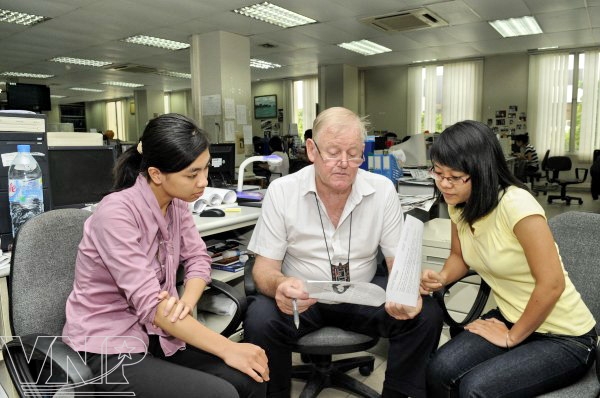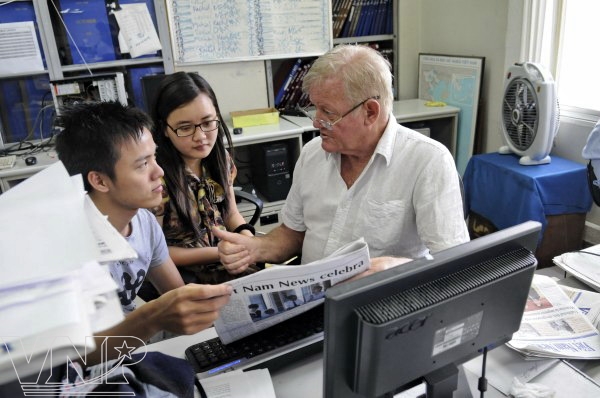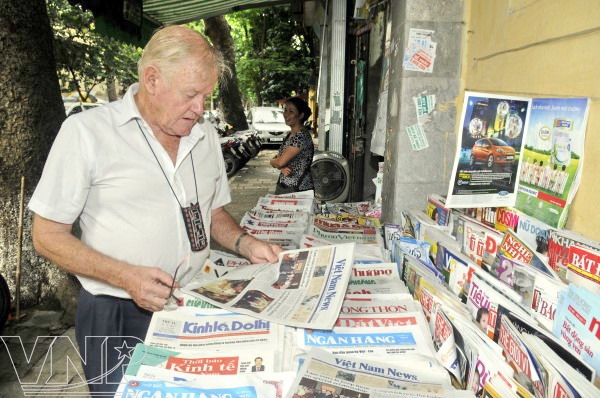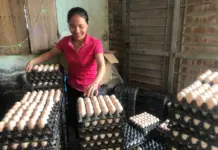Ball is a veteran journalist with 50 years of experience in working at major newspapers in Australia and Hong Kong. Four years ago, before working for Vietnam News, he worked for News Limited, an Australian newspaper owned by Rupert Murdoch, a media tycoon in Australia.
 John Robert Ball works as an English editor for Vietnam News.  Exchanging views with Vietnam News’ young reporters.  At a newspaper stall in Hanoi. |
In the 1960s, starting his career as a young journalist in Hong Kong, Ball paid attention to Vietnam. At that time Vietnam was in a war. Hong Kong, particularly the well-known bar street of Wanchai was a stop-over for American naval troops as well as war correspondents during their trips to and from Vietnam. Ball remembers at that time most journalists he met did not like the war, so he tried to call his friends and colleagues to do something to support Vietnam.
With experience in Hong Kong and other Asian countries, he went back to Australia in 1971 and worked as an editor of a monthly newspaper named “The Asian” which analyzed the relationship between Australia and other Asian countries. The cover of its first issue had the image of Vietnamese refugees landing at an Australian port to escape the war. This picture was very rare in the mass media in Australia at that time. To help the Vietnamese immigrants, “The Asian” spent one or two pages using the Vietnamese language to provide necessary information about immigration, healthcare, jobs and treatment policy for the immigrants.
Talking about Vietnam, he said: “I am particularly impressed by the people here. Vietnamese people are very friendly and President Ho Chi Minh was very great. I am also impressed with the stable family relations and the way the Vietnamese people are rebuilding their country after a century of harsh colonial domination and decades of war against foreign aggressors.”
Ball loves to discover Vietnam. Whenever he has free time he makes trips to different regions of Vietnam. After each trip, we-young correspondents have the opportunity to listen to his stories to learn more about our country through the novel and exciting experiences of an Australian journalist.
As a journalist, when working with reporters and editors of Vietnam News, he has very high demands for professional skills. He often requires those working with him to place themselves in the position of the reader to get the best results. With the practical view of a foreigner he helps the reporters and editors learn how to choose the information suitable for foreigners, the major readers of the Vietnam News. This is the thing that not every Vietnamese reporter or editor can easily recognize, especially young reporters like us.
At the editorial office we usually call him “Bac Ball” (Uncle Ball). Once, I had to “struggle” with him for nearly five consecutive hours just to deal with two phrases “lemma” and “the Fields Medal” in an article about Mathematics Professor Ngo Bao Chau. He required me to explain thoroughly, clearly and precisely the meaning of these phrases because he said that not every reader was aware of the meaning of such specialized words.
We often joke that thanks to the “Scottish substance” in his blood, he is much healthier and enduring than other people at his age. Although he is over 70 years old, he goes to work by motorbike every day. Another personality quirk of Uncle Ball is his hot-temper. If you should ever happen to visit the Vietnam News editorial office and see a westerner “shouting” in English at a reporter, don’t be surprised. Such is John Robert Ball’s typical way of working. He is ready to sit all day or he can easily lose his temper in a professional debate. He usually says, “In each debate, it is not a personal issue between me and you, but it is finally for the quality of the newspaper”.
Story: Le Quynh Anh – Photos: Dang Tra My – Tran Thanh Giang



